Schrödinger’s cat, one of my favourites ;)
9 Paradoxes That’ll Let Your Brain Have a Good Time
Logic and common sense are our best tools for solving problems in our heads, helping us find the best solution that will lead us to the best results. However, when it comes to paradoxes, these dilemmas test our minds, since their solutions seem more like a maze that leads us to the root of the problem.
Bright Side has a list of the best-known paradoxes in history to train your brain with some intellectual gymnastics.
1. The raven paradox
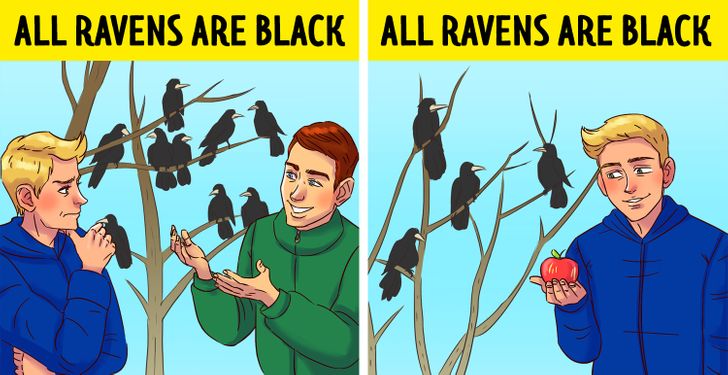
This is also known as “Hempel’s paradox” because it was proposed by the philosopher Carl Hempel. His objective was to prove that, when events coincide over time with the conditions of a theory, our confidence in this theory increases. To illustrate his argument, he gave an example: “All ravens are black.”
If we examine millions of ravens, we’ll see that they’re all black. So, we will rely more and more on the fact that the theory that says, “Every raven is black” is a true statement. When observing a red apple that, because it isn’t black, is a “non-raven,” the conviction that all ravens are black becomes stronger.
2. The Epimenides paradox
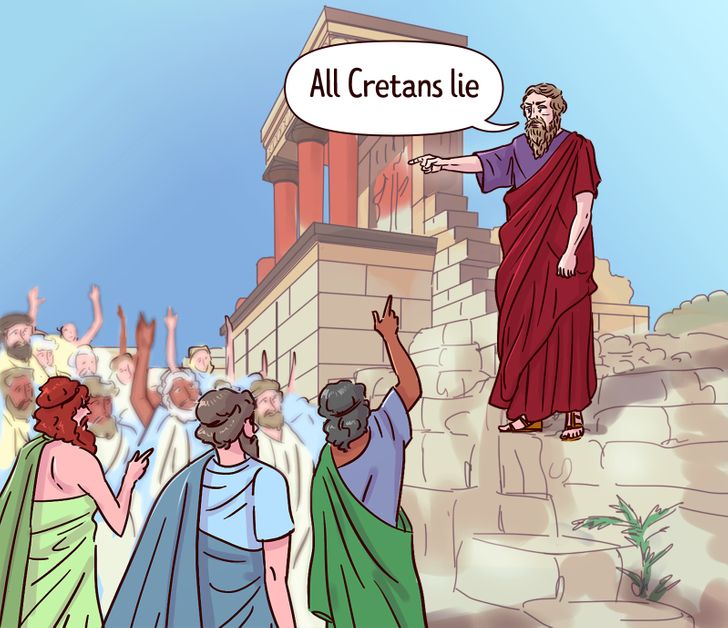
On the Ancient Greece island of Crete, a man named Epimenides of Knossos said that all Cretans were liars. It seems like a simple statement, but if it were true that Cretan was a liar, then Epimenides, who was also Cretan, wouldn’t be telling the truth.
And otherwise, if it were false that everyone on the island was a liar, Epimenides’ statement would end up being true. But because he was Cretan, it would have to be considered a lie.
3. The Abilene paradox
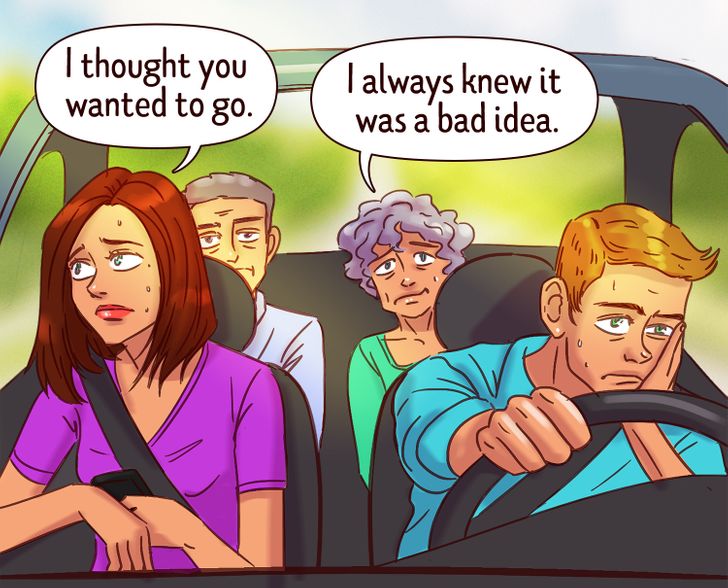
This social paradox was proposed by Jerry B. Harvey in his book The Abilene Paradox and Other Meditations on Management. In the example, a family is playing dominoes on the porch of their house: a couple and their in-laws are present.
The father-in-law proposes to go to Abilene, a town that is 50 miles from where they are. The wife says that it’s a good idea to take the trip, although she’s not convinced, because it’s a hot day. However, she believes that no one will agree with her. The husband also accepts, assuming that his mother-in-law is eager to go, and so, they set off on their journey.
As the wife anticipated, it was a long, hot, and tiring trip. The food they ate at the cafe they stopped by was bad, and they decide to go home after a few hours. On the way back, the wife mentions in a sarcastic tone that the journey wasn’t a very good idea. The husband replied that he only agreed to it to please his mother-in-law. She didn’t actually express an opinion about the trip, and the father-in-law says he suggested the trip because everyone looked bored.
They were puzzled as to why they had jointly taken an action that no one wanted to take. With this dilemma, Harvey tries to explain how some situations may force us to do things that aren’t necessarily up to our will.
4. Schrödinger’s cat
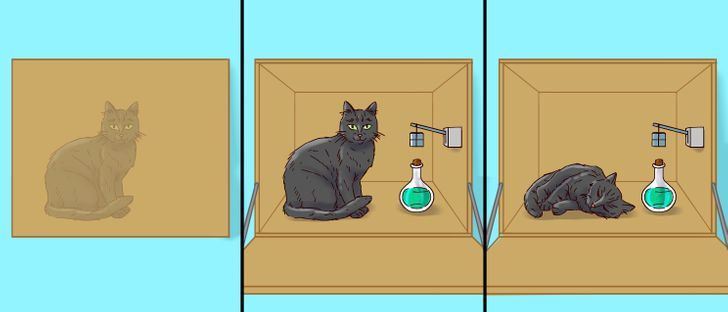
Austrian physicist Erwin Schrödinger created a system consisting of an opaque box containing a bottle with poison, a device with a single radioactive particle that had a 50% chance of exploding, and a cat. So the cat had a 50% chance of surviving in the box.
Electrons have the ability to be in 2 places at the same time, like the receptors that indicate whether the cat is alive or dead, and they present both results at the same time. However, it’s not until the box is opened that anyone will be able to know whether the cat is dead or not. While the box is closed, both statements are correct, leading to the paradox.
5. The grandfather paradox
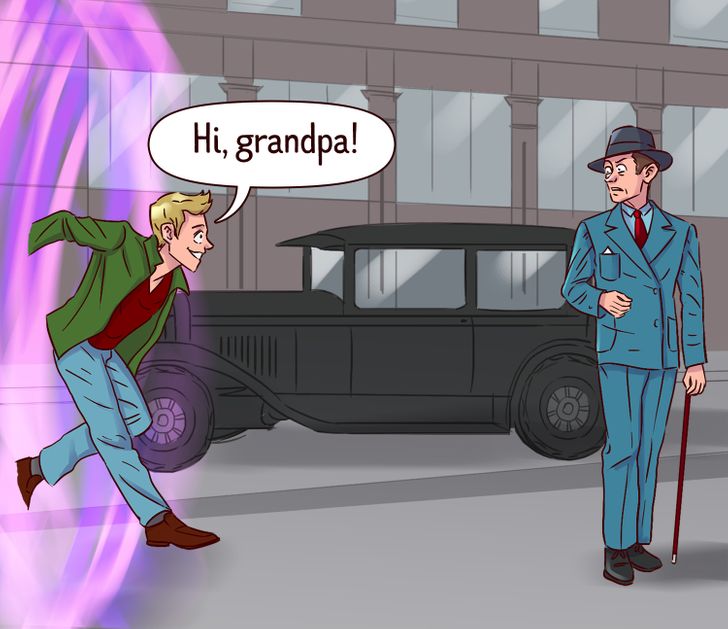
This dilemma is also known as the paradox of time travel and was proposed by science fiction author René Barjavel in 1944 in his novel Future Times Three. In it, he imagines that a man travels to the past and kills his grandfather, the father of his biological father.
Following this, if his grandfather died in the past, then he could never have been conceived; therefore, we wouldn’t know who may have murdered his grandfather in this case. Another option is that the grandfather would survive, making it possible for the traveler to be conceived, and so on.
6. The twin paradox
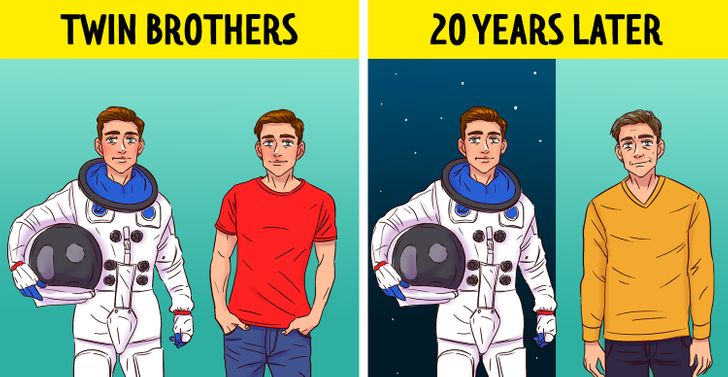
This one was proposed by Albert Einstein to explain the theory of relativity, establishing that the measurement of time isn’t absolute since it depends on the movement and perspective of the viewer. The paradox relates to the story of 2 twins. One would make a long interstellar journey at a high speed, while the other would remain on Earth for about 20 years.
The prediction establishes that the twin who stays at home will age faster, thanks to time dilation. In other words, he’ll perceive time pass slower. Therefore, the twin who left in the spaceship will return looking younger, because, after having traveled at a high speed, it’ll seem that time goes by faster. And all of this is thanks to the fact that time is relative.
7. Hilbert’s paradox of the Grand Hotel
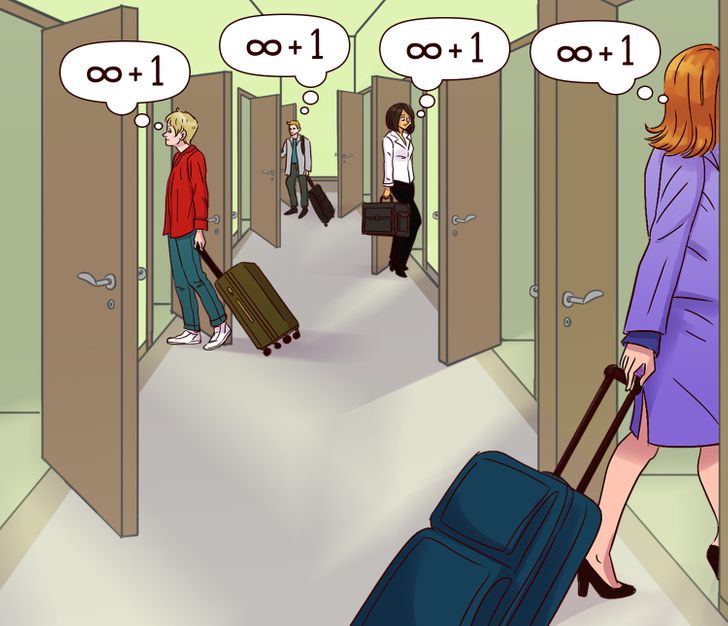
To explain the paradoxical facts within the concept of infinity in mathematics, Hilbert used the story of 2 great hoteliers who aspired to build the largest hotel in the world. When asked how many rooms they would have, they concluded that if someone built a hotel with more accommodations, theirs would soon cease to be the largest in the world. So they decided to build a hotel with an infinite number of rooms.
With the opening of the infinite hotel, everyone wanted to stay there, so its infinite rooms were occupied by infinite guests and there was no space for more people. To fix this without leaving any visitor without a room, they asked their customers to add the number 1 to their room number and move to that new room number. The guest from room 1 moved to room number 2. The one from room 2 moved to room number 3, and so on. This way, accommodation number 1 was available.
Sometime later, countless guests arrived, and, once again, there was no problem hosting them. Visitors were asked to multiply their room number by 2 so that they all occupied an even numbered room. The result was that the infinite guests would occupy the infinite odd numbers.
8. The crocodile paradox
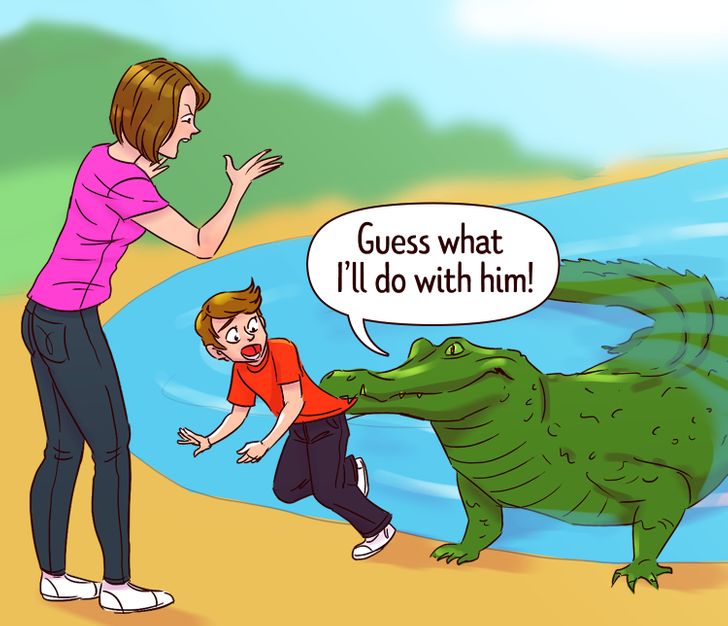
This dilemma was used to reveal the problems of logic regarding what we don’t yet know, but still have an idea of what could happen. The paradox is illustrated with the story of a crocodile that takes a child from his mother’s arms. The crocodile promises the woman that it’ll only return her son if she can guess what it’ll do with him.
The mother replies that it will eat him, creating a dilemma for the reptile. If the crocodile decides to eat the child, it would break its promise, because the mother would have guessed, and then according to the promise, it should return her son to her. If the crocodile decided to deliver the child, the mother could be wrong, but she would still have her son back.
9. The ship of Theseus
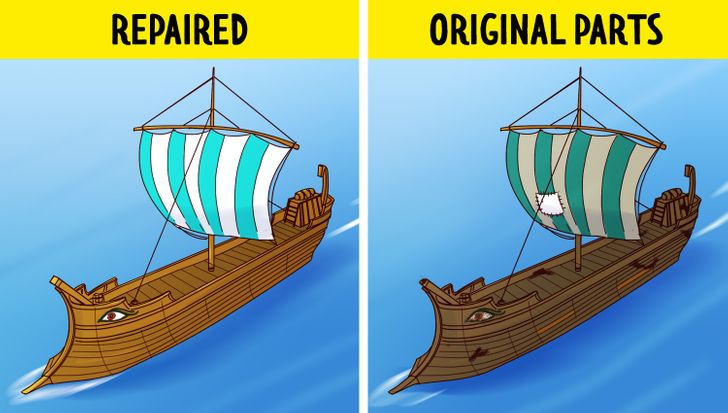
According to the Greek legend, Theseus was returning to Athens from Crete, along with several young people in a 30-row boat. The boat had been preserved for generations and was in good condition, because every time a board on the ship broke, it was replaced by a new one.
This brought up opposite opinions among philosophers as to whether the ship was the original or a different one, since its parts had been replaced. They posed this question: if the pieces of the original ship were put together, then which would be Theseus’ ship, the one that had been repaired through the years or the one from the old pieces?
Do you know of any other paradox that has left you thinking for hours? Do you think you have the solution for any of the above? Share your conclusions in the comments.
Comments
That is some mind-confusing stuff :X
some of these are just riddles, I don't think a paradox has an answer
Related Reads
I Refuse to Raise My 18YO Stepdaughter’s Baby

I Canceled Thanksgiving After My MIL Tried to Enforce Her Infamous “Family Code of Conduct”

My Dad Is Refusing to Pay for My Wedding, Even Though He Paid for My Sister’s Wedding

I Discovered My Wife’s Secret Google Photo Gallery and Feel Utterly Disgusted

25 Bright Side Readers Shared Their Kids’ Wildest Pranks

10+ True Stories With Endings No One Saw Coming

Pregnant Women Reveal 14 Insane Things People Actually Said to Them
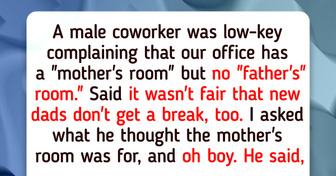
11 Stories of People Who Experienced a Glitch in the Matrix

My MIL Secretly Removed All Vegan Options From Our Wedding, So I Gave Her a Taste of Her Own Medicine

I’m Tired of Being Treated Like a Free Babysitter Just Because I Don’t Have Kids

10+ People Who Couldn’t Believe What Was Happening to Them

My MIL Had Too Many Opinions About My Stepson—So I Asked Her to Leave
